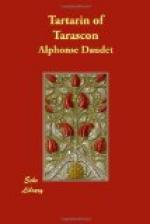This Sidi ben Tart’ri was of course none other than Tartarin. Well what could you expect. This sort of thing happens even in the lives of Saints and Heroes. The illustrious Tartarin was, like anyone else, not exempt from these failings and that is why for two whole months, forgetful of lions, forgetful of fame, he wallowed in oriental love, and slumbered, like Hannibal in Capua, amid the delights of Algiers.
He had rented in the heart of the Arab quarter, a pretty little local house with an interior courtyard, banana trees, cool galleries and fountains. He lived there quietly in the company of his Moor, a Moor himself from head to foot. Puffing at his hookah and munching musk-flavoured condiments. Stretched on a divan opposite him, Baia with a guitar in her hands droned monotonous songs, or to amuse her master she perhaps mimed a belly-dance, holding in her hands a small mirror in which she admired her white teeth and made faces at herself.
As the lady did not understand French and Tartarin did not speak a word of Arabic, conversation languished somewhat and the talkative Tarasconais had time to repent of any intemperate loquaciousness of which he might have been guilty at Bezuquet’s pharmacy or Costecalde the gunsmith’s shop. This penance even had a certain charm. There was something almost voluptuous in going all day without speaking, hearing only the bubble of the hookah, the strumming of the guitar and the gentle splashing of the fountain amid the mosaic tiles of his courtyard.
Smoking, the Turkish bath and “l’amour” occupied his time. They went out little. Sometimes Sidi Tart’ri, with his lady mounted on the crupper, went on mule-back to eat pomegranates in a little garden which he had bought in the neighbourhood... but never on any account did they go down to the European part of the town, which with its drunken Zouaves, its bordellos full of officers and the sound of sabres trailing on the ground beneath the arcade, seemed to him to be insupportably ugly. Altogether our Tartarin was perfectly happy. Tartarin-Sancho in particular, very fond of Turkish pastries, declared himself entirely satisfied with his new existence. Tartarin-Quixote had perhaps now and then some regrets, when he remembered Tarascon and the promised lion skins... but they did not last for long, and to dispel these moments of sadness all that was needed was a look from Baia or a spoonful of her diabolic confections, scented and bewitching like some brew of Circe’s.
In the evenings prince Gregory came, to talk a little about free Montenegro. Of indefatigable complaisance, this agreeable nobleman undertook in the house the function of interpreter and, if need be, even that of steward, and all for nothing. Apart from him, Tartarin had only “Teurs” as visitors. All of those ferocious bandits which in the depths of their dark shops he once found so frightening, turned out to be harmless tradesmen, embroiderers, spice sellers, turners of pipe mouthpieces. Discrete, courteous people, modest, shrewd, and good at cards. Four or five times a week they would spend the evening with Tartarin, winning his money and eating his confitures, and on the stroke of ten leaving politely, giving thanks to the Prophet.




